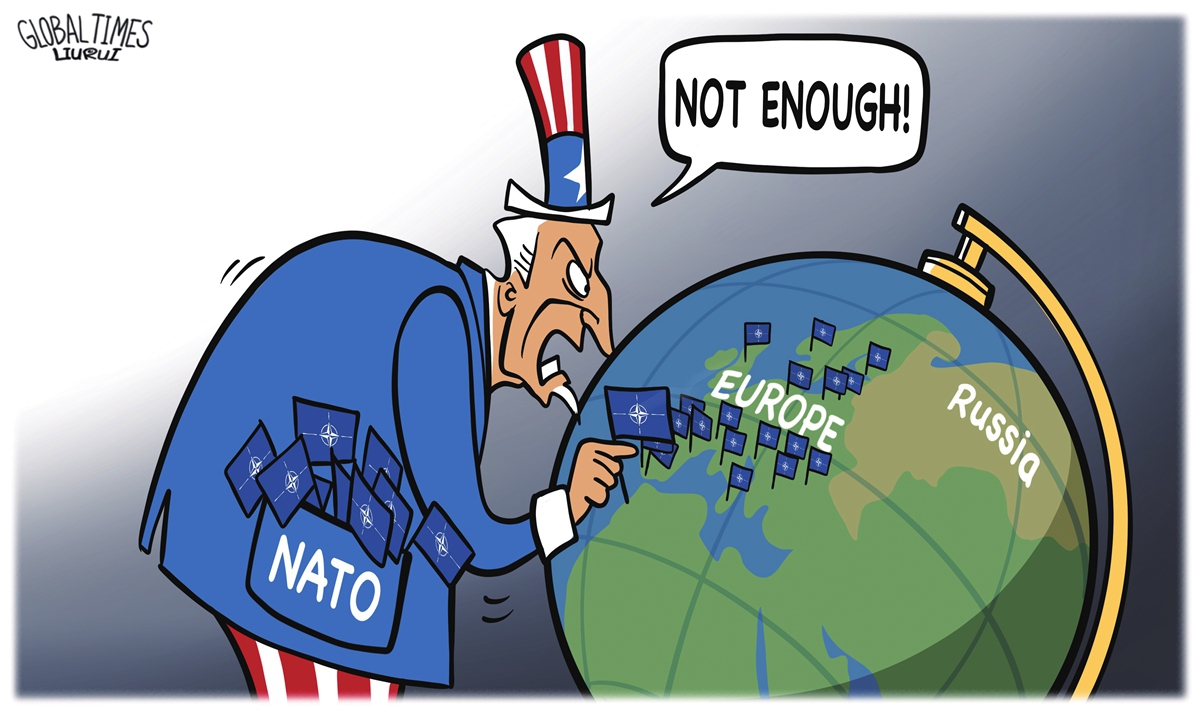China denounces NATO’s Asia reach as ‘dangerous’ as bloc intensifies anti-China rhetoric ahead of summit

Nato expansion. Illustration: Liu Rui/Global Times
US President Joe Biden will start his European trip this weekend to use the G7 and NATO summits as platforms for coordinating with allies to jointly counter China, including inviting leaders from Australia, Japan, New Zealand and South Korea to take part for the first time. It seems NATO has found its purpose for survival through expansion worldwide, particularly seeking to extend its reach into Asia to cooperate with the US' China strategy. But Chinese analysts warned that NATO will be further split and even face crippling as trouble and contradictions inside the organization will snowball amid NATO expansion.
A senior US official said leaders from Australia, Japan, South Korea and New Zealand will for the first time join the NATO Summit to show that the Ukraine crisis has not detracted from the West's focus on China, Reuters reported on Wednesday.
NATO Secretary General Jens Stoltenberg said on Wednesday that since the NATO summit will address China in their new Strategic Concept for NATO, he welcomes leaders of NATO's Asia-Pacific partners - Australia, Japan, New Zealand and South Korea - to the summit.
He said NATO don't regard China as an adversary but "we need to realize the rise of China." He said he expects that "allies will state that China poses some challenges to our values, our interests, and our security."
In response, Wang Wenbin, spokesperson of the Chinese Foreign Ministry, said at Thursday's media briefing that as the world's largest military alliance led by the US, NATO is a tool for the US to maintain hegemony and manipulate a security pattern in Europe, and NATO tried to copy the pattern of bloc confrontation in Europe in the Asia-Pacific region, which is very dangerous and will trigger firm opposition from regional countries.
NATO has already disrupted stability in Europe. It should not try to do the same to the Asia-Pacific and the whole world. The Asia-Pacific is beyond the geographical scope of the North Atlantic. Countries and people in the Asia-Pacific are strongly opposed to anything said or done to extend military bloc to this region or stir up division and confrontation, Wang noted.
NATO, which was previously called by many as suffering from brain death, was revived amid the Russia-Ukraine crisis. As a strategic tool manipulated by the US, it is making a foray into Asia. But will Asian countries be puppets of the US-led NATO to work for the US' China containment strategy?
According to media reports, South Korea has decided to establish a mission to the NATO in Brussels, a presidential official said Wednesday ahead of President Yoon Suk-yeol's participation in a NATO summit next week.
But an official from the presidential office emphasized that attending the NATO Summit has absolutely nothing to do with the possibility of a shift toward "anti-China" and "anti-Russia" policies, South Korean media KBS reported.
The new Strategic Concept to be adopted at the NATO Summit has nothing to do with South Korea, the official said.
The new concept to be endorsed by NATO leaders is expected to address threats posed by China, according to Reuters.
Lü Chao, an expert on the Korean Peninsula issue at the Liaoning Academy of Social Sciences, told the Global Times that unlike Japan, which mainly seeks to counter China's influence using NATO, South Korea developing relations with NATO was more of a symbolic hope to raise its status and strength in participating in international affairs, instead of targeting China.
In meeting with State Councilor and Foreign Minister Wang Yi on Wednesday, South Korea Ambassador to China Jang Ha-sung, who is leaving his post, said that during his three-year stint as ambassador, he has witnessed the major achievements of South Korea-China relations, and he believes that bilateral friendship and practical cooperation will be further deepened.
Lü believes South Korea President Yoon Suk-yeol has seen clearly that developing ties with China will not only benefit both countries but contribute to regional peace and stability, and it will not completely side with the US. But analysts warned that that does not mean China-South Korea relations will be smooth sailing, as according to local media, Seoul is thinking of enabling the full-fledged operation of a THAAD anti-missile unit which would seriously undermine China-South Korea relations if it went on with the operation, analysts said.
"If the quadrilateral meeting of the four Asian nations does happen during the NATO Summit, the main elements in the talks will probably involve economic and trade cooperation, and geo-security," Da Zhigang, director of the Institute of Northeast Asian Studies at Heilongjiang Provincial Academy of Social Sciences, told the Global Times on Thursday. "The four countries may also explore the prospect of their independent development outside of the US-led NATO and G7."
Because this potential four-party meeting would not involve the US, Da said the talks are not likely to target China explicitly.
"The possibility of Japan and Australia steering the conversation toward the 'China threat theory' cannot be ruled out, but that topic would not be welcomed by South Korea and New Zealand," he said.
Further split
As to whether NATO could successfully expand in Asia, to include countries such as Japan into its membership to serve the US' China containment strategy, Chinese analysts said it is unlikely to materialize.
First, residents of many NATO members including the US will not allow their governments to keep finding themselves new enemies, when Russia-Ukraine conflict has led to souring energy prices and other serious consequences such as raising people's living costs, Wang Yiwei, director of the Institute of International Affairs at the Renmin University of China, told the Global Times.
Around 70,000 Belgian workers marched through Brussels where NATO headquarters is located this week demanding government action to tackle rising living costs, Reuters reported.
Belgian inflation hit 9 percent in June, mirroring sharp increases elsewhere driven primarily by the impact of the Russia-Ukraine conflict on supply chains and energy and commodity prices, media reported.
Song Zhongping, a Beijing-based military expert, told the Global Times that even if some Asian countries wanted to be NATO members, NATO would not accept them due to membership restrictions.
NATO clearly said that countries with territorial disputes will be a factor in determining whether to invite a state to the alliance, and Japan clearly does not meet the requirement.
The US is losing control of NATO as it has been split with many European members having their own concerns, and many NATO members cannot risk losing China, the second largest economy, as their important partner, Song said.
Even for the US, if Donald Trump wins a second term as US president, some US officials and scholars are worried that he may withdraw the US from the alliance, as he has accused NATO members of being "delinquent" in defense spending, according to Newsweek.
Even though NATO appears to be united through the Russia-Ukraine conflict, as NATO continues to expand, there will be more and more trouble and conflicts and the internal division will be expanded, analysts said, noting NATO was divided on whether to solve the Ukraine crisis through dialogue or keep fanning the flames and provoke Russia, and Turkey has been blocking Finland and Sweden from joining NATO.
Analysts warned that the global expansion of NATO will make the alliance more fragmented, and the troubles may cripple the alliance.
Photos
Related Stories
- German Chancellor Scholz assures NATO of support ahead of summit
- NATO chief says to boost forces on eastern flank
- NATO mulls pre-assigned forces for eastern flank members
- Global Insight | How NATO dragged Russia, Ukraine into a conflict
- Global Insight | How 'dark' is NATO's dark side?
- How US uses NATO to defend its hegemony and private interests
- Turkey's concerns on Sweden, Finland's NATO bids "legitimate": president
- Turkey not to allow "terror-supporting" countries to join NATO: president
- NATO chief urged to stop spreading smearing remarks targeting China: spokesperson
- Erdogan, Macron discuss Ukrainian crisis, NATO expansion
Copyright © 2022 People's Daily Online. All Rights Reserved.









